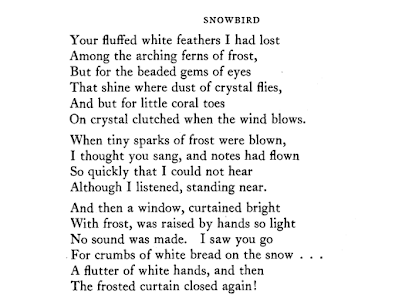27 this morning, overcast. Now some light snow and chance of freezing rain later. Temps in the mornings have been similar the past few days, but yesterday was a pretty day, almost warm at 40 degrees.
We're having a little fluff of snow this afternoon, which isn't expected to amount to much. I'd remarked to Larry the other day that I had not seen any snowbirds, but they are flocking to the feeders today. Perhaps they've been here and I didn't notice, but I don't think they arrived until recently as I know I had not seen them before Christmas.
Usually these little visitors arrive at the end of November or beginning of December. When they come we know cold weather is ahead, and when they leave we feel pretty sure the worst of winter is behind us. The official name for these hooded and winged birds is Dark-Eyed Junco, but Snowbird seems to fit them well. The website Birds and Blooms has some interesting information about this species, including research that suggests that it is not temperature but the length of daylight that affects their migrating patterns. Which makes me wonder why the birds arrived later this year? While temperatures are warmer than historically, the length of days remains the same.
This is an older photo from my blog, but one of my favorites.
I had forgotten this beautiful song. Anne Murray sings it here.
This poem was published in a 1928 edition of Poetry magazine. I subscribe to Poetry but didn't realize how long it had been in publication. One thing that is noticeable in older poems is the adherence to rhyme and rhythm in most works; today's poetry usually has a discernable rhythm, but rhyming is not often used anymore, and exclamation points are even more rare. This was written by Glenn Ward Dresbach, a poet born in Illinois, but who spent the later years of his life in Arkansas. Dresbach was originally an accountant, but his life was anything but boring. He worked in the canal zone in Panama for the Panama Railroad from 1911 to 1915, then moved to New Mexico to work, signed up and served in WWI as a medic. After the war, he married and moved to Texas,and later back to his home state of Illinois, still working in the financial field. In 1932 he quit work and devoted his time to writing poetry. He was widely published and well known as a poet during his lifetime, but his poetry has fallen out of favor in our times. Still, this little poem has images that I like, and I especially like the second verse.
Copyright Susanna Holstein. All rights reserved. No Republication or Redistribution Allowed without attribution to Susanna Holstein.


I also associate the appearance of the junco flock with Winter's arrival here in Massachusetts. Last Winter I realized they were more comfortable eating seed scattered on the ground under a huge twiggy (but leafless) shrub, as were the cardinals, so I put seed there every morning. This year, with Mox and Della much more interested in "birding," I've tried scattering some seed in the safer fenced area where the hanging feeders and wildlife water basin are, but I suspect the squirrels hoover up most of the seed from the ground before a junco gets much of a chance. Haven't solved this puzzle yet, but now you've got me thinking about it, so maybe I'll come up with something. Hope all is well with you and yours, Susanna.
ReplyDeleteIt's been cold here too. In the last week we've had hail and some snow. Today the footpaths were icy so we waited until the sun melted it and then went shopping for groceries. Enjoy your day!
ReplyDeleteHi Quinn, we are all well--thanks for asking. I read on the All About Birds site that juncos like crushed millet seed best, and on the ground as you say. They seem to be happy with our sunflower seeds from the feeders, though, and happily clean up on the ground the mess the other birds make. I am glad to see them again; such cheerful little critters.
ReplyDelete